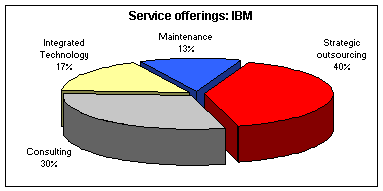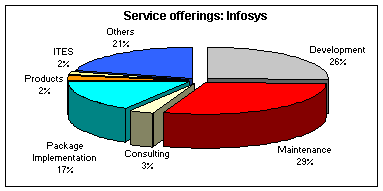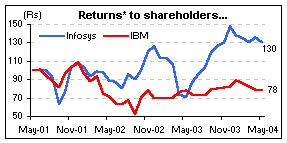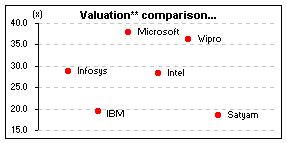IBM. Infosys. One is the world's largest technology company. The other is India's second-largest. The first has $89 billion in consolidated revenues for FY04. The second has a meager 1.3 per cent of the same.
However, keeping the 'size' factor aside, these two companies have established benchmarks on the capabilities, vision and execution fronts.
In this article, we will try to compare these two technology majors -- IBM and Infosys. In case of IBM, we will take into consideration the company's global services and software (products) divisions only.
International Business Machines (IBM)
Incorporated in the state of New York in 1911, IBM is a gaint in the world of technology.
Currently, the company derives its revenues from five major streams, viz., global services (48% of revenues), hardware (32%), software (16%), global financing (3%), and enterprise investments (1%).
As we have said, for comparison purposes, we would take into consideration only the global services and software division of the company. These two segments have grown at a CAGR of 6% over the period FY00 to FY04.
The staid growth is the testimony of the slowdown that had engulfed the global technology industry and had affected IBM's revenues, specifically from these two segments.

Within the global services segment, the company derives the largest chunk of its revenues from strategic outsourcing (40% of global services revenues) and consulting services (30%).
Higher contribution from the consulting space is indicative of the domain competency that the company possesses in verticals like telecom, healthcare, utilities and finance.
IBM also benefits from the software (products) segment, which contributes to around 16% of the consolidated revenues. The benefit arises from the fact that this segment contributes heavily to the bottomline growth of the company (gross profit margins at 87% in FY04).
 |
 |
Infosys
Infosys, on the other hand, is recognised globally for its world-class management practices and work ethics. The company has been on a constant move up the software value chain and offers services, among others, like software development (26% of revenues), maintenance (30%), IT consulting (3%) and ITES (2%).
The company offers these services through its highly integrated global delivery model. Revenues have grown at a CAGR of 53% between FY00 to FY04, which is significantly higher compared to IBM, albeit at a lower base.

In a case similar to IBM's, as the technology slowdown had engulfed clients across the globe, while volumes continued to remain strong, billing rates were under significant pressure.
However, the slowdown has actually provided a fillip to the whole outsourcing space. As such, Infosys has been able to achieve high (relative to the industry) levels of growth through its endeavor of moving rapidly up the software value chain (36% of revenues is derived from high-end services).
The company seems just on the threshold of entering into the league of global players like IBM.
However, on the products front, Infosys' move has been rather slow. Its banking product, Finacle, contributes to just around 2 per cent of the consolidated revenues and has not been able to support it falling margins.
We believe that the contribution from this segment will continue to remain miniscule (1.6% in FY07).
While this ends the background, it is important to understand that both these majors are trying to enter into each other's space. While IBM is aiming at replicating (and doing that successfully) the Indian offshore model for providing more cost-effective services to its clients, Infosys, with its capabilities on the global delivery front, is trying to develop domain competencies.
IBM has established a strong base in India (around 15,000 employees). It has indeed been successful in garnering a huge $750 million 10-year deal from Bharti Tele-Ventures for the providing development and maintenance services.
 |
 |
** Based on FY04 earnings.
At Rs 5,318, Infosys is trading at a P/E of 28.7x FY04 earnings and 19.5x our FY06 expected earnings. On the other hand, at $87, IBM trades at around 19.4x FY04 earnings.
While the United States stocks generally trade at relatively higher valuation levels compared to Indian stocks, the valuations accorded to IBM are indicative of low investor expectations. As far as Infosys is concerned, it trades at an attractive valuation from a three-to five-year perspective.
Given this backdrop, is there anything significant that is learnt from this comparison?
Equitymaster.com is one of India's premier finance portals. The web site offers a user-friendly portfolio tracker, a weekly buy/sell recommendation service and research reports on India's top companies.





